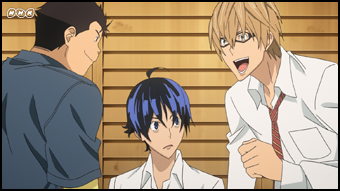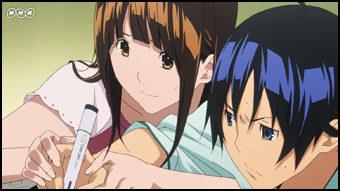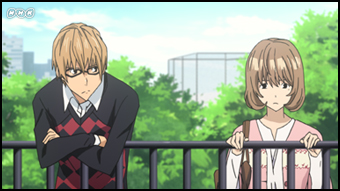 Bakuman, an anime based on a shounen manga about the making of a shounen manga, just finished its second season. I recommended the first season for anyone interested in the pressures that affect the creation of a manga. These help to explain why a series will sometimes vanish without a satisfactory ending, while another may run on forever without a satisfactory ending.
Bakuman, an anime based on a shounen manga about the making of a shounen manga, just finished its second season. I recommended the first season for anyone interested in the pressures that affect the creation of a manga. These help to explain why a series will sometimes vanish without a satisfactory ending, while another may run on forever without a satisfactory ending.
If this is your only reason for watching there is little point in watching another season. However the series can also be enjoyed as a low-key character-oriented story about young people growing up and entering the world of adulthood. The sort of story that usually appears only in seinen or josei manga and is almost unheard of in shounen.
This is not to say that the story is totally realistic. It does have some definite shounen traits. I don’t think that manga authors in real life spend nearly as much time as this story would have you believe shouting about how pumped up they are to have the opportunity to match their skills against such worthy rivals. (Though who knows. If you spend all day writing that kind of dialog maybe it would creep into your normal conversation.)
I’m also pretty sure that it is impossible to draw professional-quality manga on the tray table of a hospital bed. This kind of stuff is just there to add the sort of artificial drama that a shounen manga requires.
More thoughts below, including significant spoilers:
 The biggest surprise of the second season is how the artificial long-distance romance between Mashiro and Miho, which I initially dismissed as absurd and doomed, has become increasingly plausible.
The biggest surprise of the second season is how the artificial long-distance romance between Mashiro and Miho, which I initially dismissed as absurd and doomed, has become increasingly plausible.
Gradually their email-only relationship has become deeper as they pour out their hopes and fears and constantly support each other. By comparison the more “normal” relationship between Kaya and Takagi has much more shallow communication.
Ironically the tomboyish independent-minded Kaya seems to have committed herself to becoming a traditional Japanese housewife, while the ultra-feminine Miho has arranged things so that she can devote herself full-time to her career, while still maintaining a sort of pure-hearted romance.
The big question of course is what will happen to Miho and Mashiro when they finally end their self-imposed separation.
 It’s also interesting how Aoki has evolved from an ojou-sama ice queen to a fully sympathetic character. As we see how vulnerable she is beneath her icy facade, her determination to succeed as a shounen manga artist seems more and more courageous. She is in a male-dominated profession, surrounded by men who all too often treat her with skepticism, hostility or even sexual harassment.
It’s also interesting how Aoki has evolved from an ojou-sama ice queen to a fully sympathetic character. As we see how vulnerable she is beneath her icy facade, her determination to succeed as a shounen manga artist seems more and more courageous. She is in a male-dominated profession, surrounded by men who all too often treat her with skepticism, hostility or even sexual harassment.
That being the case it is odd that she seems to have a potential romance building with Fukuda, who seemed to be her chief tormentor during the first season. I guess that she would rather associate with a colleague who yells at her but respects her as an artist, than one who pretends to be nice but is really only interested in her as a woman. Underneath the icy facade, below the underlying loneliness and vulnerability, she really is as tough as steel.

